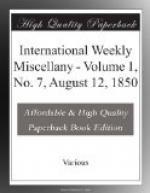We have glanced briefly at Sir Robert Ker Porter’s wonderful talents, and Anna Maria, when in her twelfth year, rushed, as Jane acknowledged, “prematurely into print.” Of Anna Maria we knew personally but very little, enough however to recall with a pleasant memory her readiness in conversation and her bland and cheerful manners. No two sisters could have been more different in bearing and appearance; Maria was a delicate blonde, with a riant face, and an animated manner—we had said almost peculiarly Irish—rushing at conclusions, where her more thoughtful and careful sister paused to consider and calculate. The beauty of Jane was statuesque, her deportment serious yet cheerful, a seriousness quite as natural as her younger sister’s gaiety; they both labored diligently, but Anna Maria’s labor was sport when compared to her eldest sister’s careful toil; Jane’s mind was of a more lofty order, she was intense, and felt more than she said, while Anna Maria often said more than she felt; they were a delightful contrast, and yet the harmony between them was complete; and one of the happiest days we ever spent, while trembling on the threshold of literature, was with them at their pretty road-side cottage in the village of Esher before the death of their venerable and dearly beloved mother, whose rectitude and prudence had both guided and sheltered their youth, and who lived to reap with them the harvest of their industry and exertion. We remember the drive there, and the anxiety as to how those very “clever ladies” would look, and what they would say; we talked over the various letters we had received from Jane, and thought of the cordial invitation to their cottage—their “mother’s cottage”—as they always called it. We remember the old white friendly spaniel who looked at us with blinking eyes, and preceded us up stairs; we remember the formal old-fashioned courtesy of the venerable old lady, who was then nearly eighty—the blue ribands and good-natured frankness of Anna Maria, and the noble courtesy of Jane, who received visitors as if she granted an audience; this manner was natural to her; it was only the manner of one whose thoughts have dwelt more upon heroic deeds, and lived more with heroes than with actual living men and women; the effect of this, however, soon passed away, but not so the fascination which




